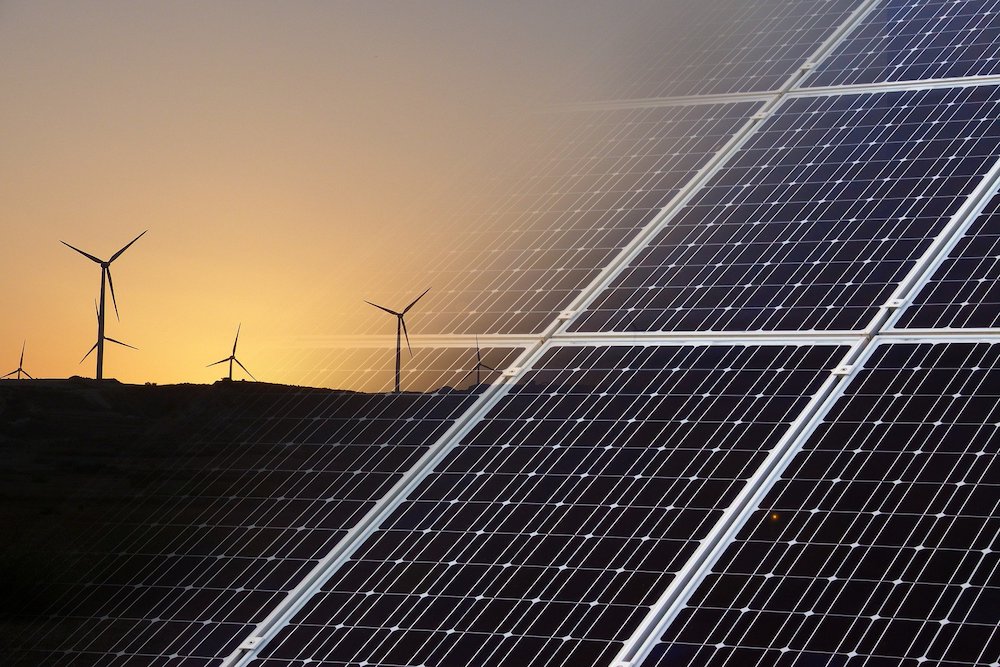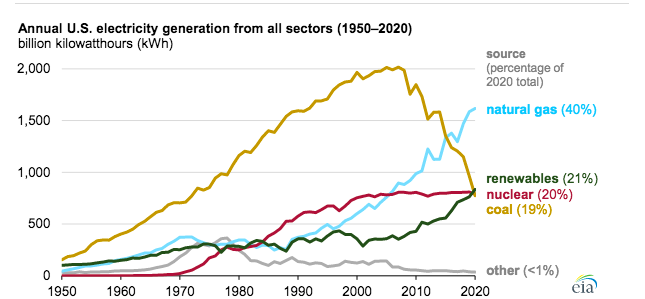
Renewable energy generation in the U.S. increased by 9% between 2019 and 2020, with wind energy growing by 14%, solar projects of more than 1 megawatt by 26% and small-scale solar, such as rooftop panels connected to the grid, by 19%, according to the U.S. Energy Information Agency. (seagul/Pixabay)
Editor's Note: EarthBeat Weekly is your weekly newsletter about faith and climate change. Below is the Aug. 6 edition. To receive EarthBeat Weekly in your inbox, sign up here.
There has been a mix of good and bad news on the climate front in recent days.
Some good news came out of the U.S. Energy Information Administration, which reported that in 2020, the combined amount of energy generated from renewable sources — including wind, solar, hydroelectricity, geothermal and biomass — exceeded the amount from any other source except natural gas.
The 834 billion kilowatt hours of electricity from renewables amounted to about 21% of total generated energy, up 9% from the previous year, the agency reported. Coal showed the sharpest decline, down 20% from 2019. That means renewables edged out coal and nuclear energy for the first time on record.

In 2020, for the first time, the total amount of energy generated in the U.S. from renewable sources — including wind, solar, hydroelectricity, geothermal and biomass — exceeded the amount from any other source except natural gas. (U.S. Energy Information Administration)
Nevertheless, renewables still generated only about half as much electricity as natural gas, and natural gas use continued to increase. That is happening despite warnings from scientists that the world's nations are falling far short of the commitments needed to stave off the worst effects of a warming climate.
China, India, South Africa and Saudi Arabia — some of the world's largest greenhouse gas emitters and key players in international climate negotiations — are among the countries that missed the July 30 deadline for submitting more ambitious emissions-reduction pledges ahead of the United Nations climate summit, COP26, to be held in November in Glasgow, Scotland.
This week, NCR environment correspondent Brian Roewe reports that Fatih Birol, executive director of the International Energy Agency, told a Catholic gathering that the upcoming climate summit must send an "unmistakable signal" that continued investment in fossil fuels will lead to financial losses as countries increasingly adopt clean energy.
Birol made the remarks at a virtual gathering of the Laudato Si' Movement — which, as Roewe also reports, is the new name adopted by the group formerly known as the Global Catholic Climate Movement to better reflect its mission.
When Birol was asked what Catholics can do to support his message, the IEA leader responded that "they can help investors, including institutional ones, understand that continuing to finance new fossil fuel projects is risky not just for their own profits, but for their own health and the planet, too," Roewe writes.
EarthBeat has reported recently on efforts by Catholic investors and advocates to influence the boards of oil companies and encourage them to shift away from fossil fuels. And of course we've been covering the ongoing campaign to encourage Catholic institutions to divest their portfolios of fossil fuels.
Next week we'll be following up on a new report on climate change science to be issued Aug. 9 by the U.N. Intergovernmental Panel on Climate Change. This will be the first such assessment in eight years, and it is expected to have a more urgent tone, especially in light of recent disasters linked to extreme weather, including flooding in Europe and China, and extreme heat waves, which are exacerbating wildfires in places like the western U.S., Siberia and Turkey.
Between now and the November climate summit, EarthBeat will continue to look at the report's implications as a matter of environmental justice, with a special focus on how people of faith are responding.
Some things we’ve heard from readers this week:
Last week's EarthBeat Weekly began with excerpts from a speech by Lorna Gold, chair of the board of the newly renamed Laudato Si' Movement. Reader Shirley Starke had this to say:
Your article about Lorna Gold is lovely, but let us stop — RIGHT NOW! — saying that God GAVE us the rest of his creation as a gift! If he had given it to us as a gift, it would belong to us. It does not. Creation belongs to God, and we belong to him as part and parcel of his creation.
Saying it was given to *us* as a gift puts us right back in the kind of radically anthropocentric thinking that led to this crisis in the first place. And it is not what the Holy Father was saying in Laudato Si'.
We can say that our friends and neighbors are gifts from God, and the rest of creation is a gift to us in exactly the same sense, and in no other. Because our fellow creatures are our friends and neighbors (whom we tend to massacre), not our property. "The earth is the Lord's and the fullness thereof." This very serious error in Ms. Gold's thinking should have been pointed out in the article and corrected before going on to the many things she got right. It is a reiteration of the most fundamental error of all.
Let us stop saying that God 'gave' us the rest of his creation as a gift. Creation belongs to God, and we belong to him as part and parcel of his creation. Saying it was given to us puts us back in the radically anthropocentric thinking that led to this crisis in the first place.
The recent commentary by Alex Mikulich, about embracing Laudato Si' through the principle of economic "degrowth," drew this response from readers Gene and Jeanne Blish:
Background: We are a retired married couple, and we are supportive of the teachings of Laudato Si'. But we have some questions/comments about your article.
We think there is a distinction to be made between good economic growth and bad economic growth. We recognize "good" and "bad" are subjective terms, but there probably would be general agreement about certain types of growth, whether capitalist or socialist. For example, growth related to sustainable products that reduce dependence on fossil fuels (such as solar panels, electric vehicles, etc.) would be in the "good" growth category. Conversely, growth of products that continue dependence on fossil fuels would be in the "bad" growth category. Another way to look at it: Increase the good sustainable growth, and eliminate bad growth (versus the easily misunderstood "degrowth" term).
The concept of "degrowth," a "steady-state economy" or "prosperity without growth" is important for people of faith who are grappling with Pope Francis' call to build a more just and sustainable post-pandemic world. We will return to this debate on EarthBeat in the coming months.
Meanwhile, we always welcome your comments about EarthBeat's coverage, which help us widen and deepen the conversation about how we should live in our common home.
Here's what else is new on EarthBeat this week:
- In a new book, "The Water Defenders," authors Robin Broad and John Cavanagh follow grassroots opposition to opening a polluting gold mine, from the hills of El Salvador, to the halls of the World Bank, to a similarly threatened community in the Philippines. Besides chronicling the struggle, they point to lessons that could help other grassroots environmental organizers.
- Jesuit Fr. Stan Swamy, who died in custody in July after being jailed because of his defense of poor farmers and social outcasts in India, has emerged as a new icon for Catholic religious in India, reports Jose Kavi for Global Sisters Report.
- Franciscan Fr. Daniel Horan reflects on a new book that describes four practices that enable Franciscans — and invite others — to "see differently." Horan writes: "The whole proclamation of the Gospel is about bearing witness to the truth that another way to live is possible; that God's vision for human society and all creation as drastically different from the way most of us operate."
- Sr. Mary Kay Dobrovolny writes for Global Sisters Report that on a trip to Honduras, part of an effort to to show solidarity with community leaders there who face jail time or murder for advocating for human and land rights, she learned about the human right to migrate — and the right to have a decent life at home.
- Venice, the Italian city known for its canals but regularly facing flooding and pollution from cruise ships, should become a "world capital of sustainability" in the vision of Laudato Si', its archbishop Francesco Moraglia told Carol Glatz of Catholic News Service.
Advertisement
And this is some of what's new in other climate news:
- A turbine billed as the most powerful of its kind in the world has begun generating electricity from tidal currents off the coast of Scotland, the country that will host the November climate summit, COP26, reports Anmar Frangoul at CNBC.
- In the newest episode of the "Drilled" podcast, Amy Westervelt describes how oil and gas companies plan to "keep oil alive" by shifting from fuel production to increased manufacturing of plastics — using chemical processes that are also greenhouse gas-intensive to make even more of a product that has become a major pollutant.
- President Joe Biden signed off on new regulatory standards that would reverse some of the Trump administration's rollbacks of pollution and fuel economy requirements, as automakers pledged to step up the manufacturing of electric vehicles, report Tom Krisher and Aamer Madhani at The Associated Press.
Upcoming events:
Sr. Ilia Delio will speak about "Franciscan Wisdom in an Age of Science" Aug. 12 as part of a series sponsored by The Franciscan School of Theology at the University of San Diego.
You can find details about this and other upcoming events on the EarthBeat Events page, and you can add your own organization's event to the list here.
Closing beat:
The next three months, leading up to the COP26 climate summit in Glasgow, will be critical for climate justice advocates worldwide. What would you most like to know about climate negotiations, what scientists are saying and what people of faith are doing in preparation for the summit? Drop us a line at earthbeat@ncronline.org and let us know — your questions will help us shape our coverage during this critical time.
As always, if you know someone who would appreciate EarthBeat, please pass along the link to EarthBeat Weekly on our website. They can also sign up here to receive it in their inbox. Thank you for reading EarthBeat!







